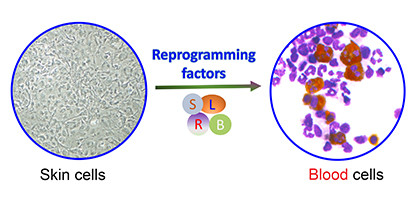Creating blood from skin cells

One of the major challenges of regenerative medicine is to manufacture new blood and immune cells for patients in need, such as those with immune disorders or who require blood transfusions. Now, Singaporean researchers have artificially generated new mouse blood and immune cells from skin cells.
The scientists, from A*STAR’s Genome Institute of Singapore (GIS) and Institute of Molecular and Cell Biology (IMCB), identified a cocktail of four haematopoietic transcription factors — Scl, Lmo2, Runx1 and Bmi1 — that can convert mouse skin cells into different types of blood cells. These four factors are normally active in blood cells, and by introducing them into skin cells, the researchers could artificially ‘rewrite’ skin cells to adopt features of blood cells.
While there were previous efforts to generate new mouse blood cells from skin cells, the yielded cells could last only two weeks once injected back into mice. In contrast, the artificially skin-derived blood cells in this study were found to last for multiple months in mice.
“This development could be a potential game changer for regenerative medicine,” said GIS Executive Director Professor Ng Huck Hui. “If researchers are able to extend what they did with the mice to human cells in the foreseeable future, it can translate into tangible benefits for the patients in need.”
Dr Kyle Loh, a Stanford University investigator and member of the project team as a former GIS intern, added that the project is “not only of practical importance for regenerative medicine… but it is also interesting from a fundamental biological perspective that two very different cells — like skin and blood — can be interconverted”.
The results of the study have been published in the journal Nature Communications.
Biomarkers for SIDS found in blood samples
US researchers have revealed the fingerprints of sudden infant death syndrome (SIDS) within blood...
Uncurling and 'gluing down' DNA molecules for sharper imaging
Researchers at Nagoya University have demonstrated techniques for stretching and immobilising DNA...
Novel 3D bioprinter can replicate human tissue
Biomedical engineers have invented a 3D printing system capable of fabricating structures that...




